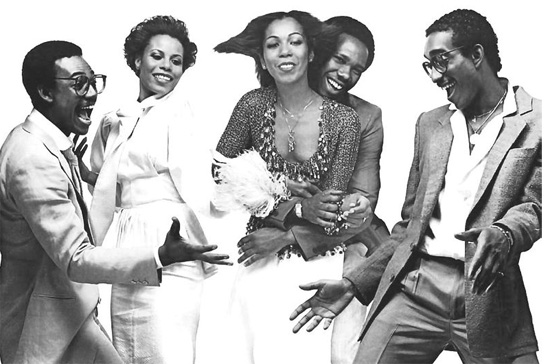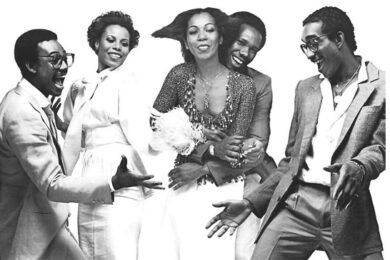One of the interesting things about disco (which never ‘sucked’ nearly as much as the various numbskull rockers that berated it so) is that, like a lot of popular dance music, it was aspirational and brought about through times of austerity. 1970s NYC was a pretty lousy place to be, and yet somehow young people became royalty via the dancefloor.
Clothes were handmade or stolen and these young peacocks strolled around, lost in wild fantasy brought on by that metronomic funk, swoonsome strings and insane basslines. Disco made you feel decadent whether your bank account backed the stats or not.
And the most apsirational of the lot were Chic, with their sophisticated take on the topic of having a good time, both the dumbest and most complicated thing for a writer to ever tackle. Complicated? Think about the successes of ‘Music Sounds Better With You’ compared to the cultural failure of the 1001 hits about being ‘in the club’. Chic somehow managed to take the notion of dancing and made the it transcendent.
Fact is, Chic and Nile Rodgers’ obsession with the dancefloor is akin to Brian Wilson’s obsession with the sea. When the Brian wrote ‘Surf’s Up’, he was no longer thinking of bushy, bushy blond hairdos – the sea represented something else, something spiritual.
In the work of Chic, having a good time didn’t simply mean freaking out, but rather, losing your shackles, opening your mind up to endless possibilities and feeling like a king despite the grinding real world outside. Chic enabled to you to get lost and see beyond the houses in your eyes.
Nile Rodgers, clearly a Sly Stone fan, saw his role in music to be the man who would tell you to "stand" because "in the end you’ll still be you, one that’s done all the things you set out to do". This may seem throwaway to the casual listener, but it’s this notion of rising above difficulties in order to become a better person – even if it was only over the course of a seven-minute 12" played on the headphones in your bedroom – that makes the body of work created by the Chic Organization so vital and exactly, oddly, what the world needs right now. It’s music that preys on your hopes, rather than your fears.
It’s the old adage of pop that it is much easier to feign sadness than joy. Chic worked through New York’s blackouts, dealt with racism by creating music that not only made you forget but also affirmed your beliefs that you are better and that you are allowed to strive for more. It’s this that almost defines Chic. Their most popular hit, ‘Le Freak’, came about thanks to turning a problem on its head. Turned away from the door of Studio 54 like so many others (alas, not many of those turned away had actually been personally invited by Grace Jones), they promptly went about writing ‘Fuck Off’, which would later become one of the most enduring pop records in history.
Rodgers, currently enjoying a richly-deserved renaissance, even overcame cancer to bring this unfashionably positive message to the world – and how perfectly timed it is.
Contemporary pop waterboards us with negatives. In the case of much of hip hop and R&B, pop music has disappeared behind a velvet rope, reporting on its own successes and the things acquired via sales. It isn’t inviting you along for the ride, it’s simply pointing out what it has that you don’t.
Elsewhere, the hipsters are digging the maudlin and mawkish. James Blake and Lana Del Rey, very much the soup of the day, have created drip-hop anthems to helplessness. Of course, there’s the thinking that these songs articulate that knot in your stomach so you don’t have to, but it nags that they aren’t actually helping anyone but their own catharsis.
The inward looking ‘Video Games’ talks of a stifling relationship, of a woman desperate to please the unyielding man. Blake’s biggest message thus far is telling you (through someone else’s words) that there’s a limit to love. Rodgers & Co created a body of music that resonated for years, with the subtly missed because of the constant, infectious groove. It’s too dumb to actually mean anything right? Good Times? Yeah, easy for you to say bucko! However, writing something so positive seems easy enough, but pulling it off and making it believable is the hardest trick in the book.
When the Chic Organization wrote ‘We Are Family’ for Sister Sledge, or indeed, sat down to pen ‘Dance Dance Dance’, they opened a can of worms later seen in Madonna (obvious Chic link), who delivered a message more important than any sixth form poetry or philosophy 101 nonsense from some dreary Indie Critic Approved! alt.pop. Madonna’s "you can dance… c’mon!" and Lady GaGa’s "just dance, it’ll be okay" carry much more resonance with people living in a gloomy, financially unstable planet than someone telling you of their own pain. The majority wants distracting at its shallowest, but also wants someone to encourage them. No-one needs a lecture when they’re feeling down and out.
The real revolution, or indeed, revelation, lies in those that will not accept the state of their surroundings, which is something that disco, and later Italo house, always excelled in. While it’s romantic to look at every protest singer from Joe Hill, Woodie Guthrie and Pete Seeger onward, there’s something more palpably powerful about those who refuse to slum it and those who will, by hook or crook, shun austerity and turn it into something immediate, beautiful and impossibly fierce.
Ostensibly, the insincerity of the Dylan-capped protest singer is dwarfed by the disco movement’s will to rise above, rather than provide some faux-voice. In the fascinating and utterly brilliant Paris Is Burning film, we see people on the breadline innovating, daring and aspiring in the face of poverty, racism, sexism, homophobia and the onset of AIDS. Through all this, they danced (yowsah, yowsah, yowsah); they brought it.
And this is precisely the message that has been missed in ‘We Are Family’, ‘Everybody Dance’, ‘I’m Coming Out’ and ‘My Forbidden Lover’. Chic did (and still do) more for our self-esteem and worth than any inward looking bozo determined to bring everyone else around them down to the floor in their K-hole. And it wasn’t the dumb thud of a throwaway hit – Chic created sophisticated, complex pop songs that afforded you the class you buried in your stomach when all those people told you that you were a worthless piece of shit. In itself, that’s more punk than punk, if you go for that kind of ‘more punk than punk’ tripe.
The most ambitious thing pop music can do is to put on a brave face and crucially, believe it. It’s insultingly easy to reflect a mood and wallow. It takes someone much braver to grab you by your lapels and drag you out of your funk with conviction.
Alas, music is obsessed with ‘the club’ but missing the subtlety of showing you a better life. Simply, pop needs to transpose a fun night out into something that reaches deeper and further. We’ve had the pleasant distraction; it’s now time to make us believe it. The world looks pretty shitty and we now need something to sustain us now the bubblegum has lost its flavour. Simply saying ‘Jason Derulo’ at the start of every song will not do.
And it’s possible. The 70s were a bleak time and birthed hip-hop and disco; twenty years later, the poll-tax riots and the fall-out of Thatcher flowered into a summer of love with house and Italo reviving this willingness to rise above the habitat. You may be treated like pond scum, but you can still float to the top. Both movements fell foul of forcing political messages into everything, but for those glorious moments when music refused to be defined by the problems that surrounded it, it created some of the most vital statements.
And now, with pop ever cyclical, 20 years later we are again faced with troubles, troubles, troubles. 2011 has got us blankly staring down barrel of cloying sensitivity in the shape of Adele, the appalling faux-modesty of Ed Sheeran and various weak-wristed schmindie bands all dressing up in their yuppie cabin-boy shoes and quiffs, noodling their keyboards behind vaguely angular guitars saying… nothing.
And somehow, Chic have made a comeback just when it was needed most. Could we, under their guidance, be on the cusp of another glorious dance revolution? Nile Rodgers could not have timed this particular comeback any better because now, more than ever, we need pop to drag us off our knees and back to the dancefloor.



